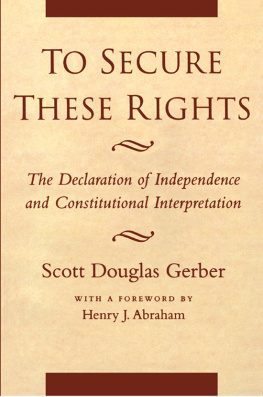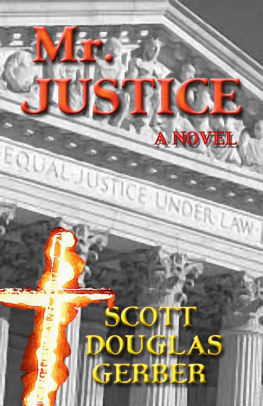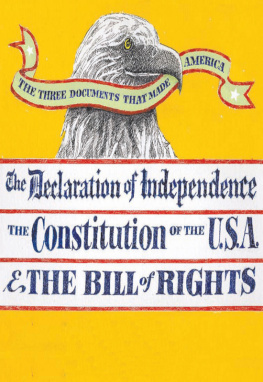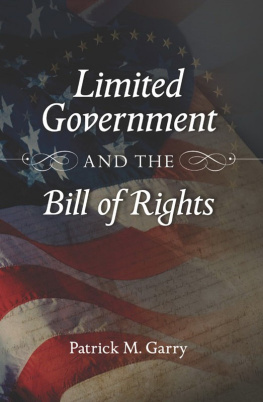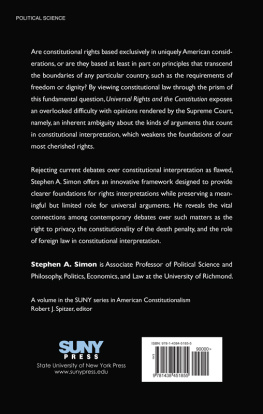Thank you for buying this ebook, published by NYU Press.
Sign up for our e-newsletters to receive information about forthcoming books, special discounts, and more!
Sign Up!
About NYU Press
A publisher of original scholarship since its founding in 1916, New York University Press Produces more than 100 new books each year, with a backlist of 3,000 titles in print. Working across the humanities and social sciences, NYU Press has award-winning lists in sociology, law, cultural and American studies, religion, American history, anthropology, politics, criminology, media and communication, literary studies, and psychology.
To Secure These Rights
NEW YORK UNIVERSITY PRESS
New York and London
1995 by New York University
All rights reserved
Library of Congress Cataloging-in-Publication Data
Gerber, Scott Douglas, 1961
To secure these rights : the Declaration of Independence and
constitutional interpretation / Scott Douglas Gerber.
p. cm.
Includes bibliographical references and index.
ISBN 0-8147-3066-3 (acid-free paper)
1. United StatesConstitutional lawInterpretation and
construction. 2. Natural lawPhilosophy. I. Title.
KF4550.G46 1995
342.732dc20
[347.3022] 94-46414
CIP
New York University Press books are printed on acid-free paper, and their binding materials are chosen for strength and durability.
Manufactured in the United States of America
10 9 8 7 6 5 4 3 2 1
Foreword
How to interpret the evolving Constitution contemporarily, and the Supreme Courts crucial role in the process, has been the abiding concern of its students and observerswhether they are lawyers, political scientists, historians, other social scientists, or humanists or the public at large. It has been a central question since the basic document was formulated on Fifth and Chestnut Streets in Philadelphia during that hot summer of 1787. The answers have been as diverse as they have been numerous, informed by wisdom as well as nebulousness, by sophistication as well as navetwith the Court quite naturally at the center of gravity of the controversy. For in the final analysis it is the high tribunal that decides what the Constitution means. To be sure, the Court is not the Constitution, pace Charles Evans Hughess facile and catchy yet misleading famed political-stump-speech observation that the Constitution is what the Justices say it is. But the Court does inexorably draw lines and, in doing so, it interprets (or misinterprets) the document. In a very real sense these lines are born of the cardinal dual fact of politico-governmental life: the quality cum capability of the individual justices and their perception of the parameters of judicial power, to wit, their stance on the fundamental dichotomy of judicial activism and judicial restraint.
The last two decades have witnessed intriguing intellectual combat between, to employ John Hart Elys challenging terminology, interpretivists and noninterpretivists: the former presumably cautiously faithful conservative adherents to specific constitutional language, the latter devotees of an expansive ad hominem, liberal philosophy, arguably substituting a commitment to equal justice at any cost for equal justice under law. Or, to categorize the cardinal difference somewhat differently, if oversimplifiedly, it represents a clash between originalist champions, generally personified by Chief Justice William Rehnquist and Robert Bork, and what-do-the-words-mean-in-our-time proponents like Justice William Brennan and Laurence Tribe.
Scott Gerber, who possesses both law (J.D.) and political science (Ph.D.) degrees, bravely and admirably tackles the complexities of the dichotomy at issue in scholarly, imaginative, commendable compass by rejecting both poles of the basic argument. In a theory he aptly calls liberal originalism, Gerber rejects the what-do-the-words-mean-in-our-time constitutional jurisprudence of modern liberals because that approach, as well-meaning as it may be, is really nothing more than legislating from the bench. And he rejects the originalism of modern conservatives because that approach, as well-meaning as it also may be, misconstrues what the Constitution is ultimately about. As Gerber persuasively demonstrates through an impressive analysis of history, political philosophy, and law, the Constitution was intended, above all else, to protect the natural rights of individualssomething that is patently at odds with the conservative originalists emphasis on majority rule. In short, Gerber advances a theory of constitutional interpretation that will likely displease both modern liberals and modern conservatives: a sure sign that he is onto something.
Gerber, whom it was my great pleasure to have as a student, has undertaken a hugely ambitious projectand in his first book, no less. His discussion ranges from a bold revision of the character of the American Revolution to a provocative reinterpretation of many of the most famous cases in Supreme Court history, with many illuminating stops along the way. (Gerbers call for a merit-based appointment process in his chapter on checks on the Court is particularly close to my heart, as he kindly notes in the text.) With clarity, intelligence, and remarkable readability, Gerber integrates a wide range of previously isolated debates in history, political philosophy, and law into an attractive and sophisticated theory of constitutional interpretationa theory that, in his words, is neither consistently liberal, nor consistently conservative, in the modern conception of those terms. In constructing his theory, Gerber shows not only that scholars from different disciplines should talk to each other, but that they mustespecially as he puts it, where the Constitution is concerned. There is much to be learned from this important book.
HENRY J. ABRAHAM
James Hart Professor of Government and Foreign Affairs
University of Virginia
Charlottesville, Virginia
Preface
This is a study in American constitutional theory. In essence, it is an effort to expound a systematic theory of constitutional interpretation. To that end, two questions are addressed. First, how should the Constitution of the United States be interpreted? Second, who should be ultimately responsible for making that interpretation? Answers are sought by examining the two fundamental documents of the American regime: the Declaration of Independence and the Constitution of the United States.
My approach to constitutional theory is through history, political philosophy, and law. And while I am directing this work chiefly to the public-law community, I try to take history and political philosophy seriously. I am therefore often engaged in an interdisciplinary conversation (to borrow historian Peter Onufs useful phrase): sometimes approaching an issue through history, at other times through political
This book is broad in scope, and many of the issues I address have themselves been the subject of a vast and varied independent literature. What I endeavor to do is identify the core components of some largely isolated debates and integrate them into the specific framework of constitutional interpretation. In other words, this is

